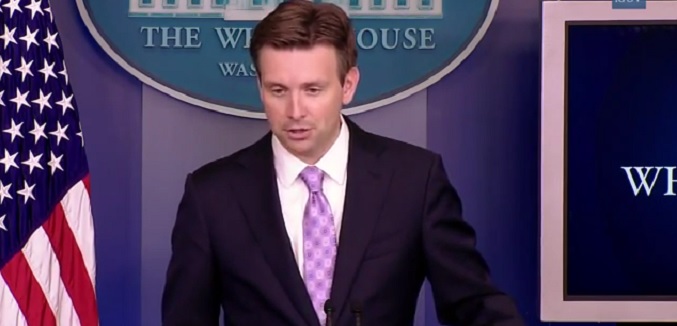Journalists on Wednesday pressed White House and State Department spokespeople on a set of commitments – made months ago to lawmakers and reporters – in which top administration officials defended nuclear negotiations with Iran by insisting that if talks failed they would cooperate with Congress in imposing new sanctions on Tehran.
Ed Henry – Fox News’s chief White House correspondent – asked White House spokesperson John Earnest if President Obama would “push forward as soon as next week on new sanctions against Iran” if a deal was not inked, declaring that that “that’s how [the administration] got Congress to get off your back six months ago.” The reference was to previous statements made by then-White House spokesperson Jay Carney, in which Carney had indicated that a failure to close a deal within six months would trigger administrative calls for new pressure on the Islamic republic:
Q But there was a promise made. Jay Carney said in December 19th, if Iran fails to reach agreement with the P5-plus-1 on the more comprehensive agreement that’s being discussed now over the course of six months, we are very confident we can work with Congress to very quickly pass new effective sanctions against Iran. Mr. Carney’s comments still valid?
MR. EARNEST: They are still valid because what Mr. Carney was saying is that if Iran doesn’t act in the kind of good faith in the context of these negotiations that we stand ready to work with Congress —
Q Well, he didn’t say good faith — he said if Iran fails to reach agreement. He didn’t say if they act in good faith or don’t. He said if Iran fails to reach agreement we will very quickly pass new sanctions. Is that still true?
MR. EARNEST: What is still true is that the Secretary of State is going to continue to consult with the President about his conversations with Iran and the P5-plus-1. The Secretary of State and senior administration officials will also consult very closely with Congress. Ultimately, it will be Congress who will have to decide whether or not additional sanctions legislation should be passed. But they will do that in consultation with administration officials about the best way to deal with these ongoing negotiations.
A similar scene played out at the State Department’s daily briefing, with Fox News producer Lucas Tomlinson pressing spokesperson Jen Psaki on statements she made shortly after an interim deal with Iran was announced:
QUESTION: Hold on. Eight months ago, you said from that podium, “If the Iranians don’t get to a yes at the end of six months, we can put in place more sanctions.” Is that not the case anymore?
MS. PSAKI: Well, look, I think, Lucas, our focus here and our primary goal is preventing Iran from acquiring a nuclear weapon. We are going to let the negotiations proceed on the ground. There’ll be ongoing discussions with a range of senior officials, with members of Congress, and I’m not going to get ahead of that process.
QUESTION: But is what you said no longer the case?
MS. PSAKI: I would have to look at the context of the comments, Lucas. But I think our goal here has remained the same and we’re looking at the negotiations through the prism of what our goal is.
Congress has for months pushed for a greater role in talks with Tehran, and the end of the six-month interim period has refocused attention on discussions over Congress’s role in negotiations.
Negotiators from Iran and the P5+1 global powers are in the process of finalizing the terms of what Reuters called “a likely extension” in talks over the Islamic republic’s nuclear program, and diplomats speaking to the Associated Press (AP) said they expected talks to end even before July 20 because, per the AP, “significant differences won’t be bridged by Sunday.”




